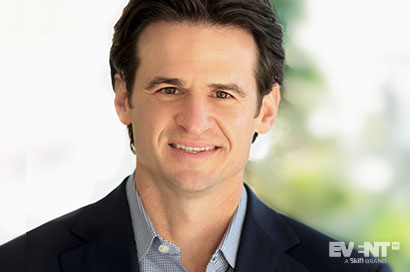Event software company Aventri was in the thick of early coronavirus-related cancellations as the tech partner for Mobile World Congress, which was the first high-profile event to announce its cancellation.
Since then, Aventri has quickly pivoted to focus on virtual events through market research and a funding round with investors. They’ve since rolled out a new native event platform designed to support hybrid, virtual, and live events all in one place.
Jim Sharpe, CEO of Aventri, joined us during our Future of the Event Industry virtual event to discuss Here’s what we learned.
The Future is Hybrid
When asked about his outlook on the short-term future of event tech, Sharpe shared that he expects a partial recovery in the fourth quarter of this year with some live events coming back, continuing into the first and second quarters of next year. However, he notes that “things will be different. Covid is going to leave its mark.”
Aventri is currently focusing on hybrid events, as Sharpe says he believes the future of events will rely on virtual components that partner well with the live event. If done right, hybrid events will enable organizers to create a more dynamic experience and reach larger audiences as well as new sponsors.
Data and Event Intelligence Will Be Key
Collecting and analyzing data is an important part of any event, but it will be even more crucial in a post-Covid era. Sharpe explains that when events start to come back, both teams and budgets will be smaller, and planners will have to work harder than ever to prove event ROI. They will need to rely on data in order to do so.
In terms of longer-term trends, Sharpe believes that this reliance on data will leave event organizers armed with a much better toolkit for proving the ROI of their events going forward. This, in turn, will allow planners to create more VIP-level experiences using the data they collect on attendee behavior and preferences.
On-Site Technology Will Evolve
The final trend that Sharpe discusses is the evolution of on-site technology. “A lot of this,” he says, “is going to be coming from safety, but we think a lot of it is here to stay as well.”
Some examples he cites include Apply Pay and NFC wristbands — anything that allows planners to maintain their data and exchange information. He sees the implementation of such tools leading to seamless check-in and badging, which will also be improved and personalized thanks to the predicted increase in data usage by organizers.
Facial recognition will also play a role in this evolution. According to Sharpe, “it’s a great way to create a good experience for attendees, but it’s also important for session control and safety going forward.”
IN CONCLUSION
While much is still unknown about the future and the precise timeline for the resumption of live events, the virtual revolution has undoubtedly sparked long-term changes in the industry.
Virtual and hybrid event tech will be at the center of the industry’s recovery, and it continues to improve as event tech companies, including Aventri, roll out more and more new products and features to meet the industry’s growing need.





